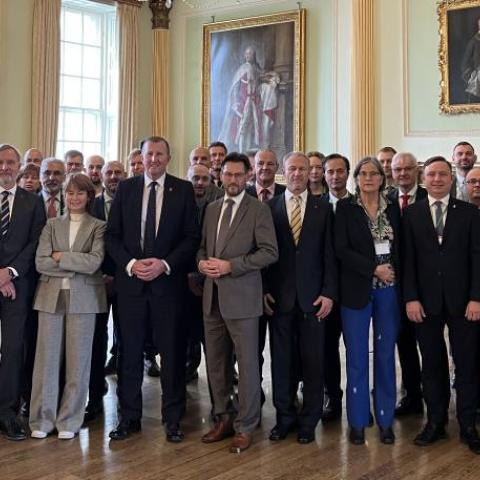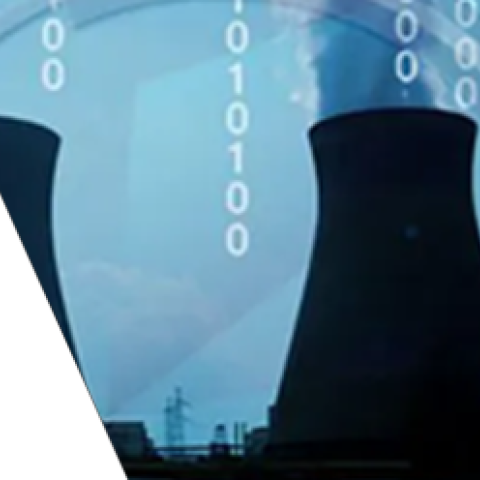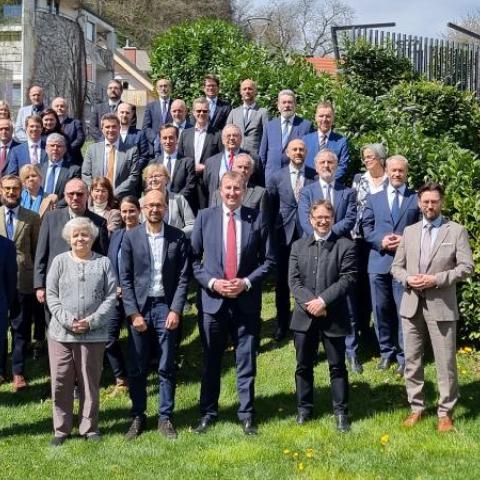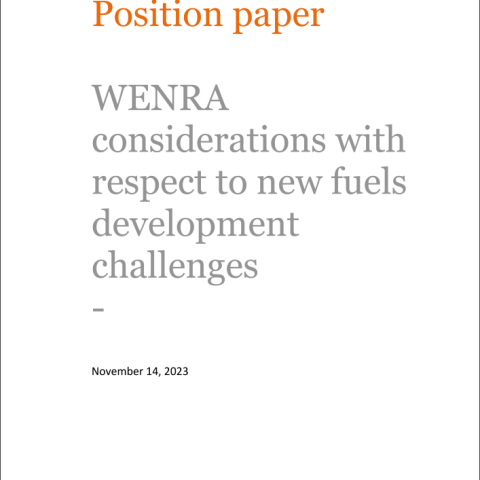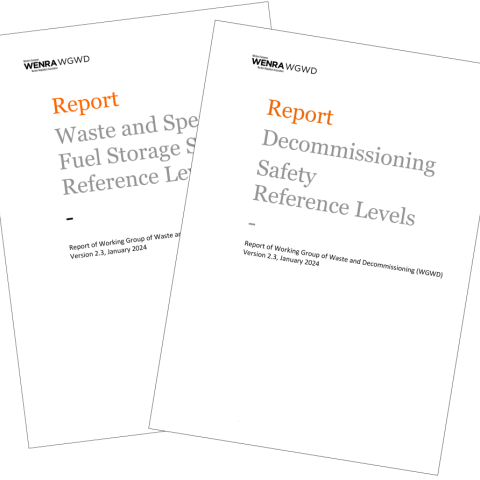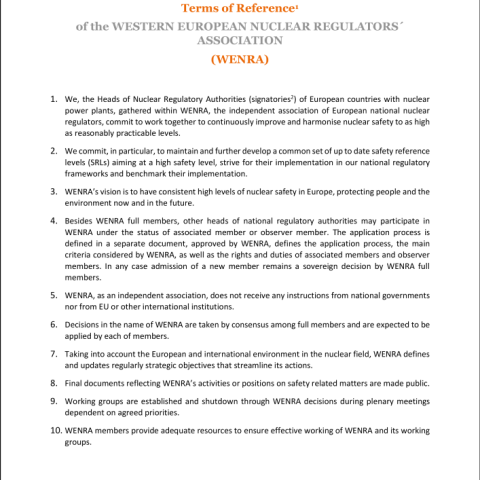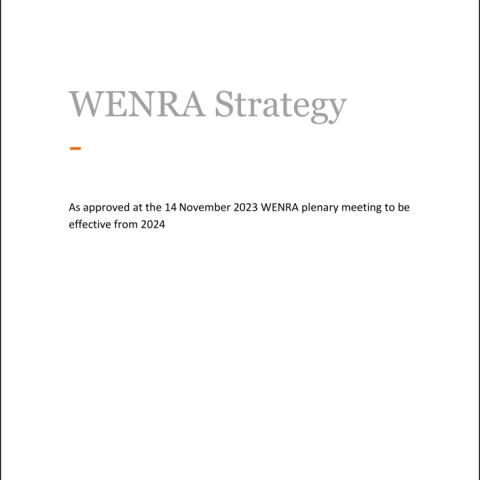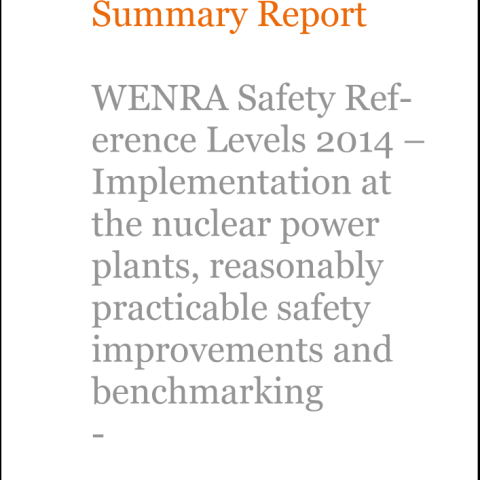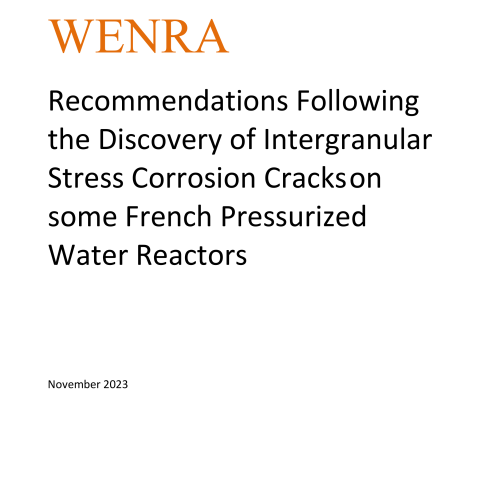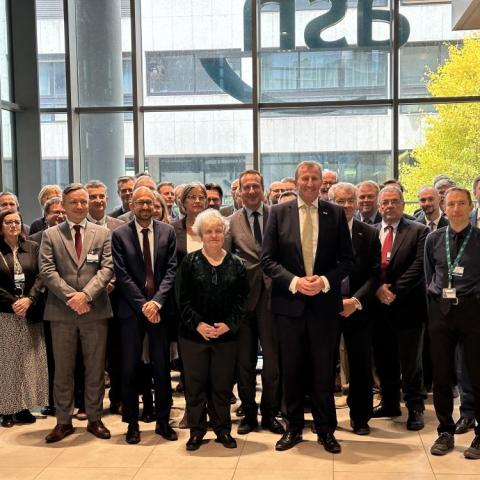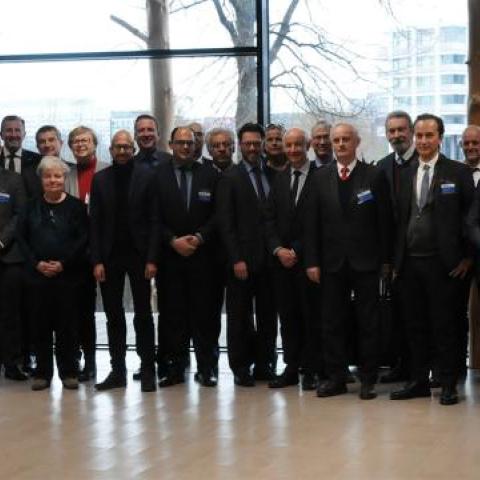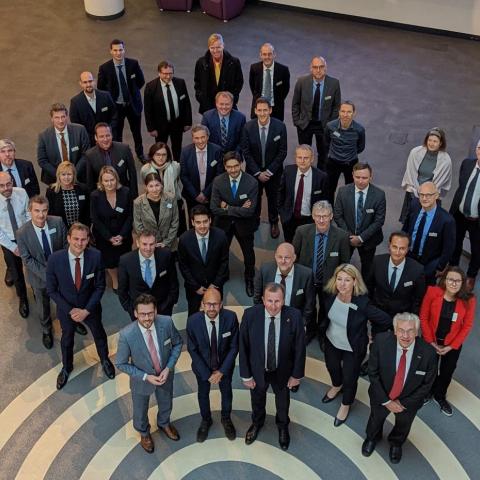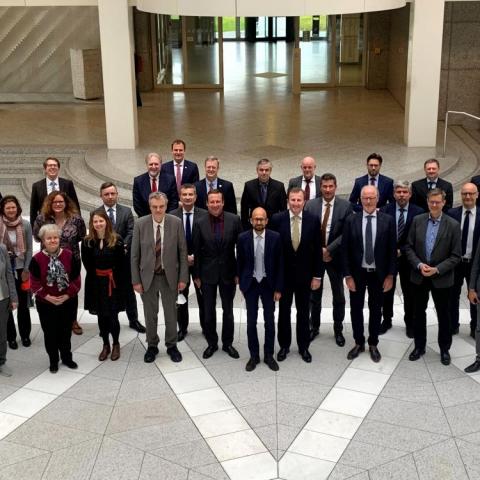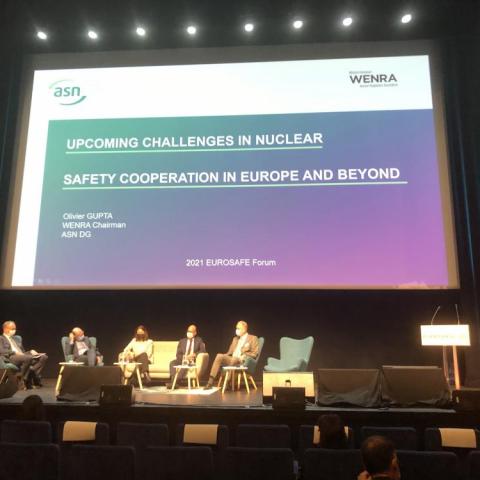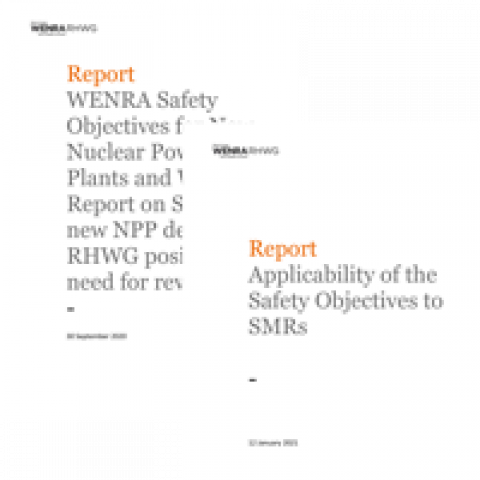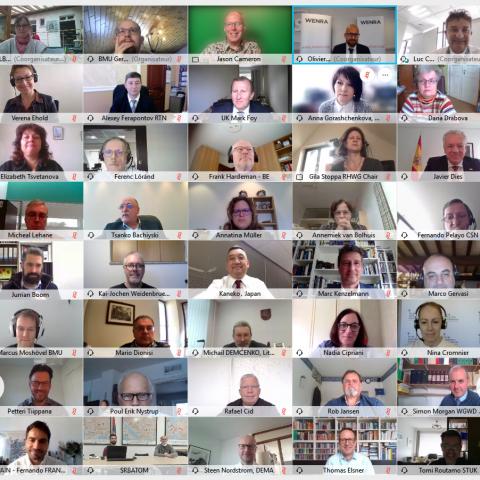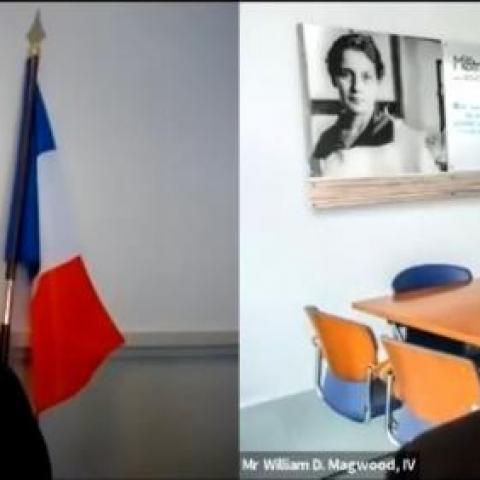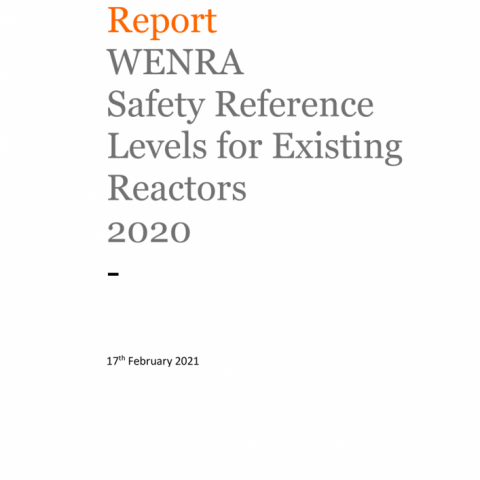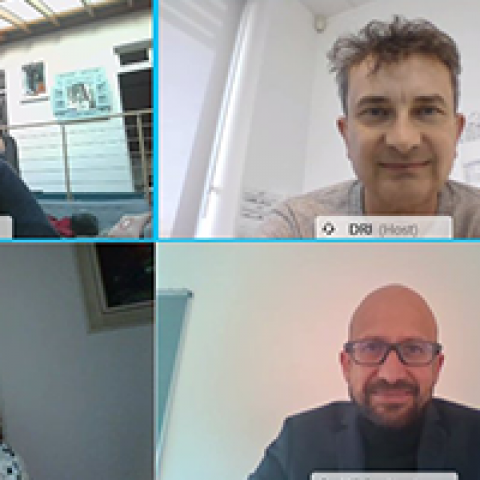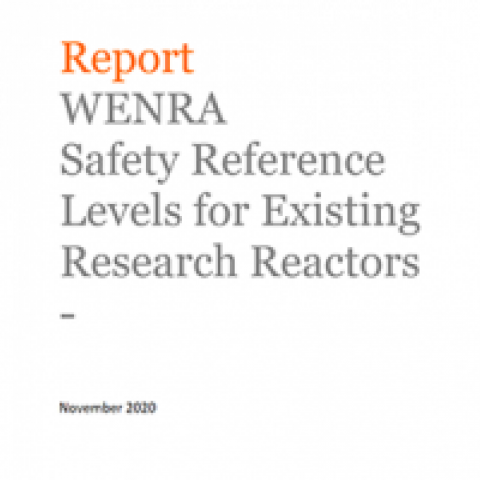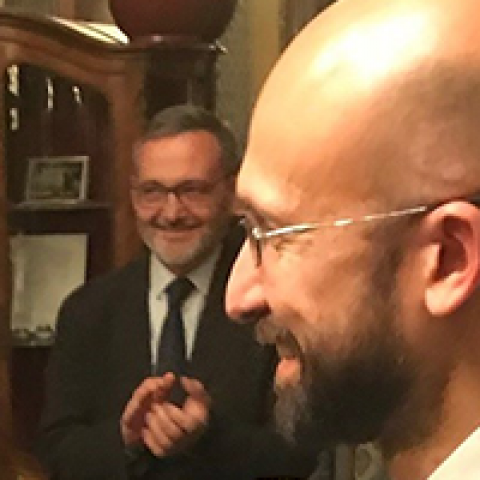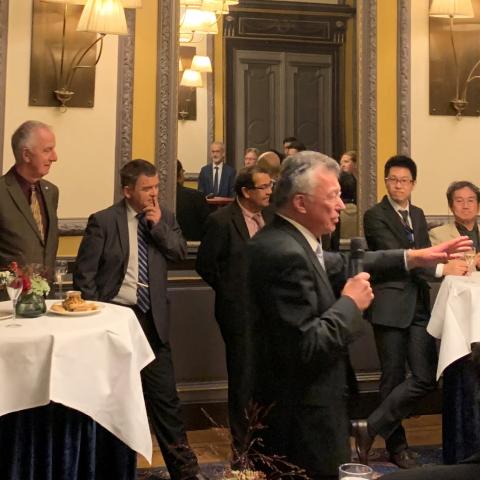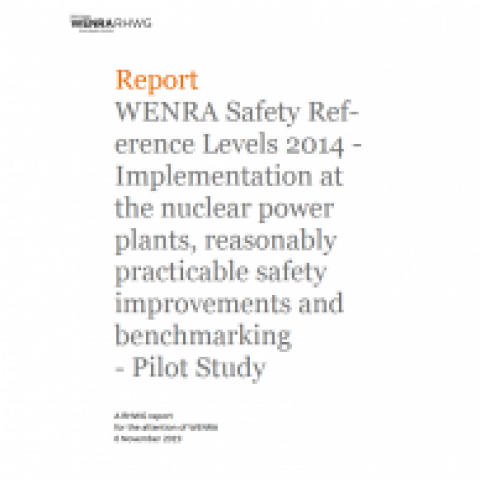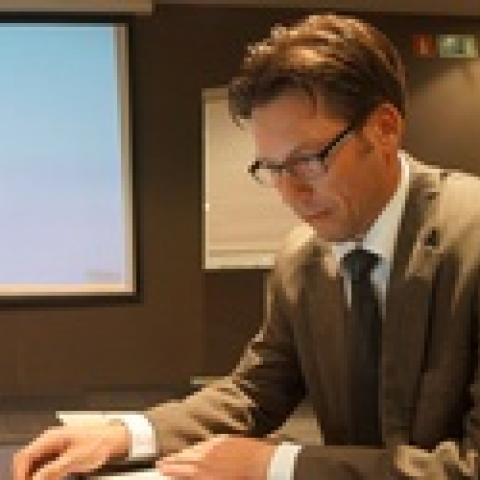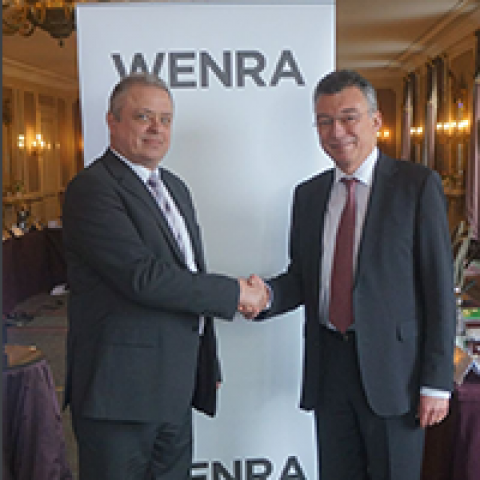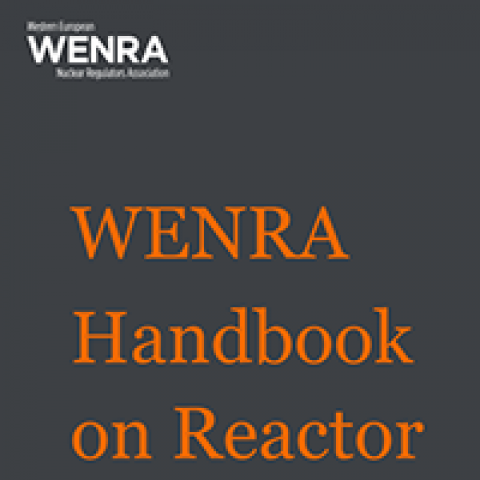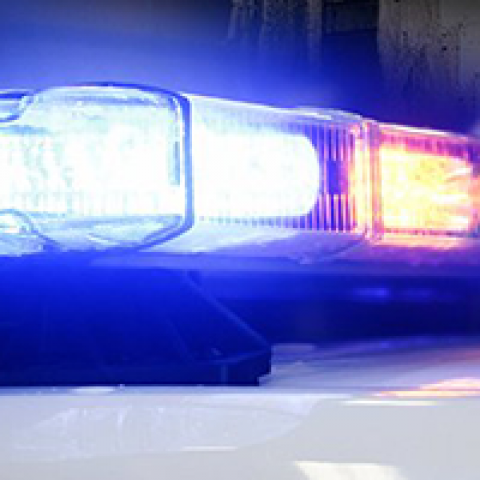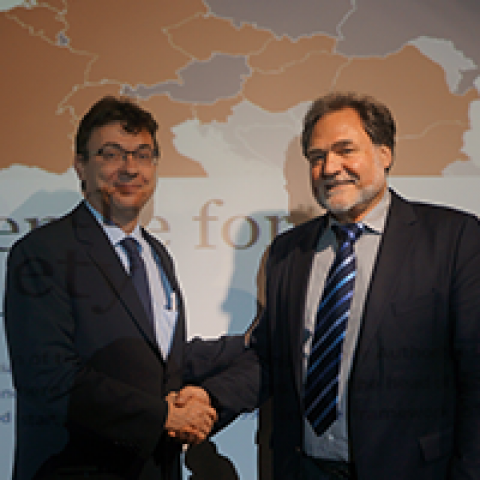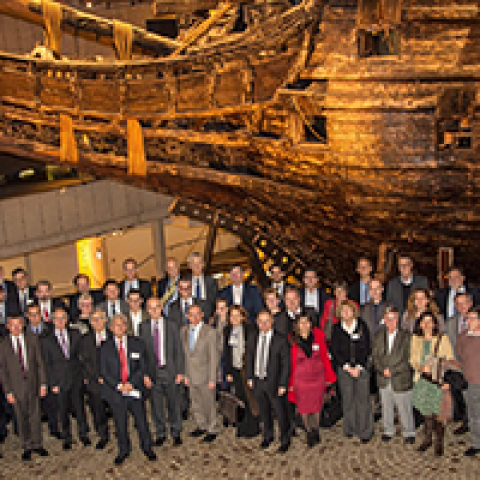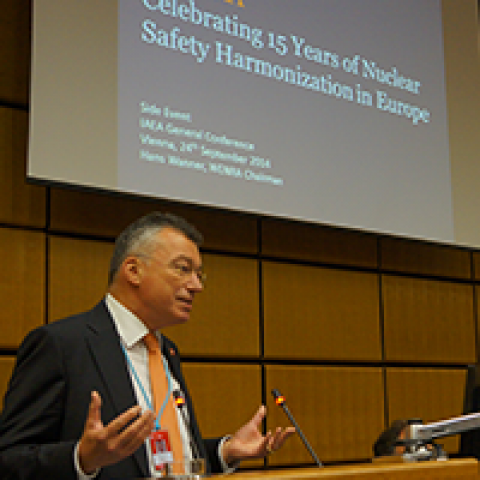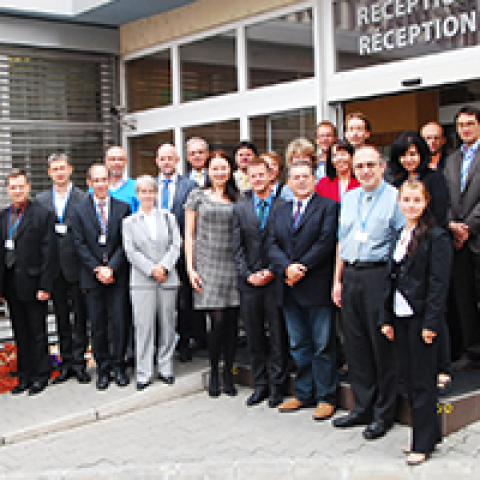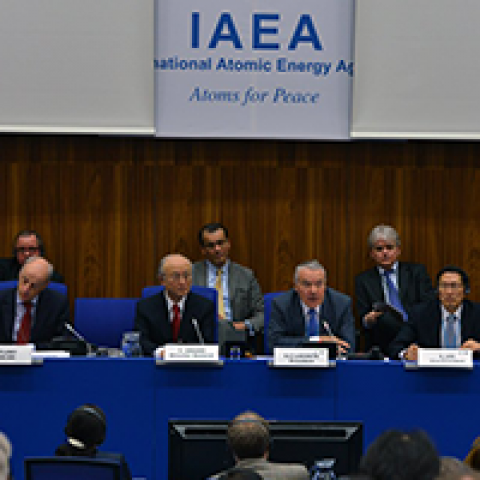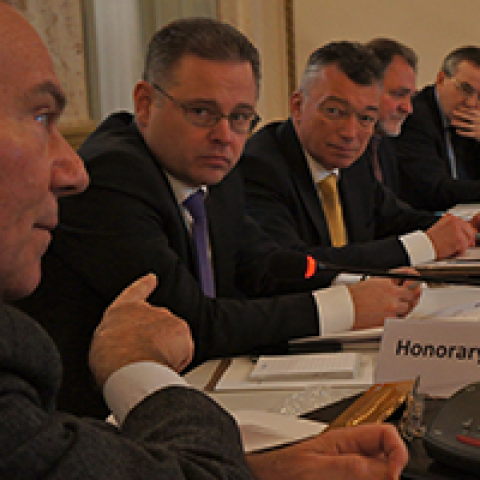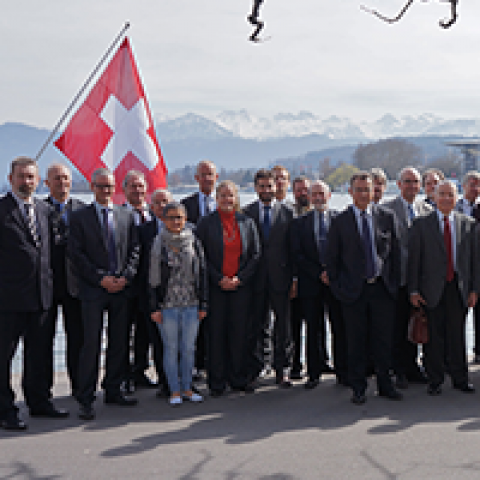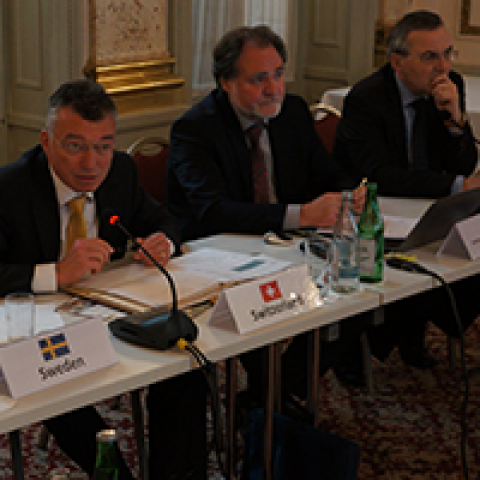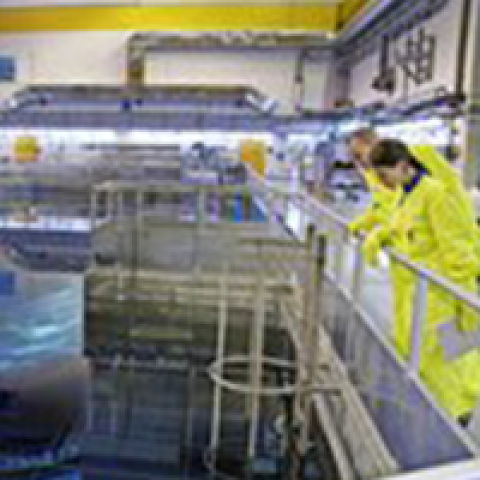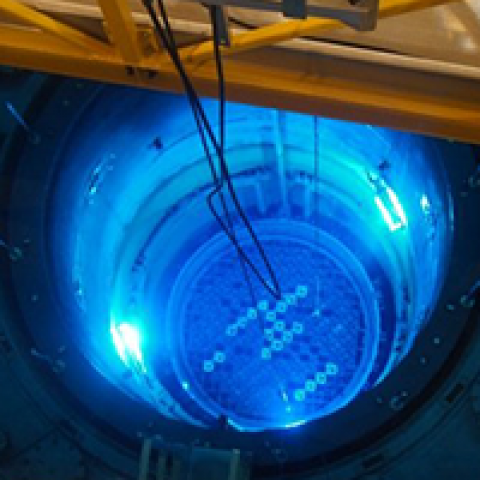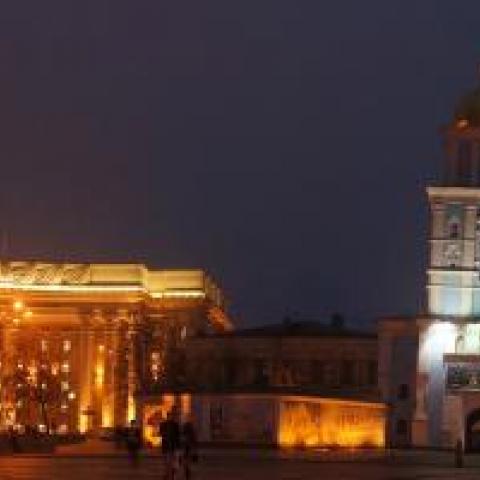News
Petteri Tiippana, Director General at the Finnish Radiation and Nuclear Safety Authority (STUK) has been appointed as the new Chair of the Western European Nuclear Regulators Association (WENRA) from 1 January 2026 for a two year term. His appointment was confirmed at the Autumn 2025 Plenary meeting, held in the UK.
The periodic safety reviews (PSR) are performed for different purposes, but always with the aim to continuously ensure and improve the safety of nuclear power plants (NPP). A PSR is always performed by the licensee. The review of a PSR is part of the regular oversight task of the Regulatory Bodies (RB) and, as for other oversight activities, in most countries does not involve public participation by itself.
The Western European Nuclear Regulators’ Association (WENRA) came together for its Fall Plenary meeting on 6th and 7th November, hosted by the Office for Nuclear Regulation (ONR), in Bath, United Kingdom. WENRA members work as a collective group of national nuclear regulators in support of its mission to continuously improve and harmonise nuclear safety to as high as reasonably practicable levels.
During their plenary meeting in April 2025, WENRA members endorsed a joined ESNRA-WENRA position paper on key principles of establishing an effective cyber security posture within the civil nuclear sector.
The Western European Nuclear Regulators’ Association (WENRA) came together for its Spring Plenary meeting on 8th and 9th April, hosted by the Slovenian Nuclear Safety Administration (SNSA), in Bled, Slovenia.
Throughout 2024, WENRA has been celebrating its 25th anniversary. At the fall plenary meeting held in Warsaw, Poland, we asked members what WENRA means to them, the importance of the role it has played over the past 25 years, and the challenges ahead. Watch what they shared on YouTube.
The Western European Nuclear Regulators’ Association (WENRA) came together for its Plenary meeting on 7th - 8th November, hosted by the Polish National Atomic Energy Agency (PAA), in Warsaw, Poland. WENRA members work as a collective group of national nuclear regulators to continuously improve and harmonise nuclear safety to as high as reasonably practicable levels.
WENRA is today re-publishing revised versions of two of its reports covering its Safety Reference Levels (SRLs) for Waste Storage and for Decommissioning. These reports were last published in 2014 and 2015 respectively and the new versions provide updates on the benchmarking of the national regulatory frameworks of 18 WENRA members that has been carried out since the previous reports.
The WENRA Terms of Reference (ToR) were updated at the November 2023 plenary meeting held in Paris.
At its November 2023 plenary meeting held in Paris, WENRA approved its new strategy.
In 2014 WENRA published the revised Safety Reference Levels (SRLs) as the result of a review in light of the learning from the TEPCO Fukushima Daiichi NPP accident. The first task for WENRA countries was to implement the new SRLs into their national regulations. Following this WENRA’s Reactor Harmonization Working Group (RHWG) started to discuss options for a benchmarking process on the implementation of SRLs at the Nuclear Power Plants (NPPs).
The discovery of some intergranular stress corrosion cracks (IGSCC) on some non-isolable pipes of the main primary system of French pressurized water reactors (PWR) in December 2021 led to a large scale inspection programme on all French PWRs, considering the potential impact of those cracks on safety of the reactors.
On 14th and 15th November 2023, WENRA held its regular biannual plenary meeting in Paris.
On the 15th June 2023, WENRA issued a position on the safety situation of the Zaporizhzhya NPP with regards to the consequences of the Kakhovka dam rupture. This position is based on the work conducted by experts from WENRA, TSOs and the European Commission.
On the 5th and 6th of April 2023, WENRA held its regular biannual plenary meeting in Helsinki.
This meeting, hosted by the Finnish nuclear safety authority STUK, was an opportunity for the association to address a number of important topics.
At its April 2023 plenary meeting, WENRA addressed the growing interest of many stakeholders of the nuclear sector in SMR projects. WENRA issued a statement that highlights its members’ interest in developing collaboration on SMRs, for instance through joint assessment processes. WENRA also expressed its expectations for the nuclear industry to ensure that such joint assessments can be carried out successfully.
Olivier Gupta, as WENRA’s Chairman, was invited as a key note speaker to participate in the 6th international Conference on Effective Nuclear Radiation Regulatory Systems organised by the IAEA in Abu Dhabi (UAE) from 13 to 16 February.
On the 9th and 10th of November 2022, WENRA held its regular biannual plenary meeting in Liverpool. This meeting was hosted by ONR, the UK regulatory body.
WENRA members discussed several important topics.
At its November 2022 plenary meeting, WENRA discussed the consequences of the current energy crisis on regulatory activities and issued a statement which highlights the importance of nuclear safety in this new challenging context.
The WENRA Working Group on Research Reactors met from 11 to 15 October in Garching, Germany. After more than two years of virtual meetings, the group could finally meet again in real life. Besides spending the necessary time on the on-going benchmarking (self-assessment and peer review) of the national regulation against the Safety Reference Levels for Research Reactors that were issued in 2020, the group wrapped-up its review of the transition of issues S to SV and T to TU for SRLs for RRs. Furthermore the position on the applicability of existing RHWG guidances on Issue F and Issue T to research reactors was practically finished. The group also visited the FRM-II research reactor and had an interesting walkdown of this installation.
On the 10th August 2022, WENRA issued a position on the safety situation of Zaporizhzhya NPP after reported shelling activities.
The WENRA Working Group on Research Reactors (WGRR) met virtually from 10 to 13 May 2022. The main topic for discussion was the on-going benchmarking (self-assessment and peer review) of the national regulation against the Safety Reference Levels (SRLs) for Research Reactors (RR) that were issued in 2020. For this, the group split up in subgroup to discuss in detail results of the benchmarking.
The WENRA Working Group on Research Reactors met virtually from 10 to 13 May 2022
Olivier Gupta, as WENRA’s Chairman and ASN’s Director General, was invited to participate in the 4th CORDEL Regional Workshop organised in Lyon, France, from the 18th to 20th May 2022.
On the 5th and 6th of April 2022, WENRA held its regular biannual plenary meeting in Bonn, Germany. Given the circumstances, Rostechnadzor and Gosatomnadzor were not invited to participate.
WENRA members have discussed several important topics.
On the 23rd March 2022, WENRA issued a position on the safety situation of Zaporizhzhya NPP with regards to the partial loss of external power supply.
On the 11th March 2022, WENRA issued a position on the consequences of a total loss of power supply at the Chornobyl site.
The on-going war increases the risk of a nuclear accident in Ukraine. WENRA and HERCA assessed the potential consequences of a severe accident, should it occur.
From January 24 to 29, 2021, the RHWG meeting was held. During this meeting, the RHWG discussed the draft Technical Specifications of the upcoming TPR and approved the NPP specific part.
The next WENRA meetings are planned to take place on 5-6 April 2022 and 9-10 November 2022
On the 23rd November 2021, Olivier Gupta was invited, as WENRA’s Chairperson and ASN’s Director General, to participate in the EUROSAFE 2021 organized by ETSON in Montrouge (France).
On the 14th and 15th October 2021, WENRA held its regular biannual plenary meeting in Paris.
The meeting was the opportunity for WENRA to make progress on several topics such as its membership, the 2023 Topical Peer Review on fire protection and the Small Modular Reactors.
In the framework of his regular meetings with key WENRA stakeholders, the WENRA’s Chair, Olivier Gupta met with ENISS representatives. During this meeting, held in Paris on 8 September 2021, several topics of mutual interest were discussed.
In 2010, WENRA issued safety objectives for new nuclear power plants (NPPs). These objectives were developed on the basis of a systematic review of the Fundamental Safety Principles (SF1 document issued in 2006 by the IAEA) and formulated in a qualitative rather than quantitative manner.
On the 13th and 14th of April 2021, WENRA held its regular biannual plenary meeting. 30 countries, including members, observers and associated members, attended this remote meeting.
On 3 March 2021, Olivier Gupta was invited, as WENRA’s Chairperson and ASN’s Director General, to participate in a webinar organised by the OECD/NEA on the occasion of the release of «The Fukushima Daiichi Nuclear Power Plant Accident, Ten Years On: Progress, Lessons and Challenges» NEA report.
WENRA is committed to continuous improvement of nuclear safety. To this end WENRA is committed to regularly revising the SRLs when new knowledge and experience are available. The last revision, in 2014, was after the TEPCO Fukushima Dai-ichi nuclear accident to take into account the lessons learned, including the insight from the EU stress tests.
On the 22nd of January 2021, the WENRA Chair, Olivier Gupta, met with Karla Petrová (SÚJB, Czech Republic), his counterpart from HERCA, the Association of the Heads of the European Radiological protection Competent Authorities.
There is a significant number of Research Reactors in operation in WENRA countries. Up to now, these facilities had not been subject to an harmonization process in terms of safety.
WENRA members take important decisions at their November 2020 plenary meeting.
On 4th and 5th November 2020, WENRA held its regular biannual plenary meeting. Almost 30 countries, including observers and associated members, attended this meeting, organized remotely due to the Covid-19 pandemic situation.
Hans Wanner resigns as WENRA Chair. His successor is Olivier Gupta, Director General of the French nuclear safety authority ASN. The official handover took place during the 20th anniversary celebration of WENRA, which took place in connection with an IAEA conference in The Hague (NL). "It was a very good event" agreed Mr Wanner and Gupta. “We were able to provide a good overview of the achievements to date, as well as the future challenges of WENRA".
On November 5, WENRA celebrated its 20th anniversary. The event took place in connection with an IAEA conference in The Hague (NL). The event was attended by representatives of European and international regulatory authorities, as well as the IAEA and industry. The event was moderated by Andrej Stritar, the former Head of the Slovenian Nuclear Safety Authority SNSA who opened by explaining how a small regulatory body from Eastern Europe was invited to the club of Western European regulators some 15 years ago.
From 5th until 7th November the WENRA workshop on regulatory aspects of decommissioning took place at and was co-sponsored by the German Federal Ministry for the Environment in Berlin. More than 75 participants from more than 20 countries from Europe, North America and South East Asia attended about 20 presentations and took the chance for extensive discussions at the scene.
In 2014 WENRA published the revised Safety Reference Levels (SRL) as a result of a review in the light of the learning from the TEPCO Fukushima Daiichi NPP accident. The first task for WENRA countries was to implement the new SRL into their national regulation. Afterwards WENRA’s Reactor Harmonization Working Group (RHWG) started to discuss options for a benchmarking process on the implementation of SRL at the Nuclear Power Plants.
The Nuclear Safety Directive of the European Union, as amended in 2014, demands that new nuclear installations be designed with the objective of preventing accidents and, should an accident occur, mitigating its consequences and avoiding early radioactive releases and large radioactive releases. Principle 1 in the Vienna Declaration on Nuclear Safety formulates the same objective for new nuclear power plants.
The WENRA Terms of Reference (ToR) were updated during the spring plenary meeting held in Budapest in April 2019. The revised version includes the Vision and Mission of WENRA as well as our Strategic Objectives. This is the fourth revision of the WENRA ToR which were signed on 4 February 1999 and revised on 14 March 2003, 26 March 2010 and 25 March 2015.
During their plenary meeting in April 2017, WENRA members decided to create a Task Force, to include nuclear safety and nuclear security experts, in order to identify challenging interface issues and areas of cooperation between nuclear safety and nuclear security. The interface between nuclear safety and nuclear security is an important aspect for nuclear regulators.
To achieve its aim of improving nuclear safety in Europe, one of the objectives of WENRA, as stated in its terms of reference, is to develop a harmonized approach to nuclear safety and regulation. For this purpose, WENRA has been developing Safety Reference Levels (SRLs) for existing reactors for more than a decade. The emphasis of the SRLs has been on nuclear safety, primarily focussing on safety of the reactor core and spent fuel, but they also include issues like safety policy, management systems and emergency preparedness.
New nuclear power plant designs propose to rely more heavily on passive systems to fulfill several safety functions. This design choice is usually driven as the passive systems relies less on human actions and support systems than active systems. Safety expectations for passive and active systems are similar and only the approaches to implement them may differ considering that passive systems operate differently.
In late 2014, mechanical tests performed in France on a Reactor Pressure Vessel closure head representative of that of the Flamanville EPR revealed the presence of a high carbon concentration in the central top part, leading to lower than expected fracture toughness values.
The WENRA waste processing report is now available in Version 1.1. Compared to version 1.0 it includes the results of the stakeholder involvement process, in which comments from ENISS and from the CoA (club of agencies) have been considered by WGWD and discussed with representatives of both organisations. The majority of modifications which were decided focus on explanatory texts and are addressing topical issues such as the graded approach.
WENRA has updated its Report on Activities in WENRA countries following the “Recommendation regarding flaw indications found in Belgian reactors”. In 2013 WENRA had recommended to its members, that all reactor pressure vessels in every European nuclear power plant should be subjected to a standardized review to check for manufacturing flaws (hydrogen-induced forging effects)
The Authority for Nuclear Safety and Radiation Protection (ANVS) became an independent
administrative body on 1 August 2017. At that moment, implementing powers in the area of
nuclear safety and radiation protection passed from the Minister of Infrastructure and the
Environment to ANVS. An independent administrative body performs government tasks, but is not
directly subject to ministerial authority. This legal form guarantees the independence of the ANVS.
In the past years, the Working Group on Waste and Decommissioning (WGWD) – one of the two permanent WENRA working groups – has documented their results and published Safety Reference Levels (SRLs) in its respective reports on the decommissioning of nuclear facilities, the processing and storage of radioactive waste and on its disposal.
In view of the conclusion of the work of the IAEA Action Plan on nuclear safety, several member states asked the IAEA to continue its work by elaborating a nuclear safety strategy.
The ENSREG meeting (24th November 2015) discussed the implementation of Art 8a of the Nuclear Safety Directive and invited WENRA to provide guidance on the question of “timely implementation of reasonably practicable safety improvements to existing nuclear power plants”.
One of the key recommendations from ENSREG following the completion of the European Stress Tests was to develop reference levels and guidance on the subject of natural hazards to drive harmonisation and improve safety. This recommendation resulted in new WENRA Safety Reference Levels (RLs) specific to natural hazards (Issue T), and a corresponding Guidance Head Document that contributes to a consistent interpretation of the RLs and provides insight into the considerations that led to their formulation.
Japan has become WENRA observers. This was approved during the WENRA fall plenary session held in Rome, Italy on 26-27 October 2016.
“I am very glad to welcome Japan as an observer to WENRA” says WENRA Chair Hans Wanner. It is obvious that participants from outside Europe can be very beneficial to WENRA by bringing more and new ideas into the discussions.”
The WENRA fall plenary meeting was held in Rome, Italy on 26-27 October 2016.
During the meeting, the Heads of the European Nuclear Safety Authorities discussed a wide range of current issues and challenges regarding nuclear safety in Europe. Among other things the latest status of the investigations at the reactor pressure vessels in Belgium and Switzerland as well as issues related to counterfeit, fraudulent and suspect items in France were discussed.
In October 2014, WENRA and HERCA (Heads of the European Radiological Protection Competent Authorities) agreed on a common HERCA-WENRA Approach for better cross-border coordination of protective actions during the early phase of a nuclear accident.
/wgdwWENRA will provide guidelines on the “timely implementation of reasonably practicable safety improvements to existing nuclear power plants” of the revised EU safety directive. The decision to establish an ad-hoc working-group to elaborate these guidelines is one of the important issues dealt with during the WENRA spring plenary meeting 2016.
The Canadian Nuclear Safety Commission (CNSC) has gained Observer status in the Western European Nuclear Regulators Association (WENRA). During the autumn plenary meeting, held in October in Madrid, the WENRA members approved the CNSC’s request to become a WENRA Observer.
Petteri Tiippana, Director General of the Finnish Radiation and Nuclear Safety Authority STUK has been appointed Vice Chair of WENRA. Mr Tiippana was appointed by the WENRA members during the recent WENRA autumn plenary meeting in Madrid, Spain.
The WENRA autumn plenary meeting was held in Madrid, Spain on 26-27 October 2015. During the meeting, the Heads of the European Nuclear Safety Authorities discussed current issues and challenges regarding nuclear safety in Europe.
A little more than one year after WENRA presented the final version of its waste and spent fuel storage report (Ver.2.2) final version 2.2 of the decommissioning report is now publicly available.
To introduce the HERCA WENRA approach for a better cross-border coordination of protective actions during the early phase of a nuclear accident, HERCA and WENRA held a side event during the 59th IAEA General Conference in Vienna.
While carrying out ultrasonic measurements of the reactor pressure vessel of the Beznau 1 nuclear power plant in Switzerland, the operator detected flaw indications that require evaluation. The measurments were carried out as a result of the 2013 WENRA Recommendation in connection with flaw indications found in Belgian reactors.
The operator Axpo submitted a corresponding report to the Swiss Federal Nuclear Safety Inspectorate ENSI on 15 July. Beznau 1 is presently inactive because of the main annual overhaul. ENSI is now awaiting an assessment of these findings by Axpo. Operation of Beznau 1 may only be started again if the safety of the reactor pressure vessel is confirmed.
At the end of April 2015, FANC held another meeting in Brussels with the International Review Board (IRB), an international panel of experts in the effects of radiation on material properties. The experts investigated the results of the additional test campaigns conducted by Electrabel over the past year. These mechanical tests were carried out on specimens containing hydrogen flakes that had been previously irradiated in the BR2 research reactor at the SCK•CEN.
The Belgian nuclear regulatory authority FANC has developed guides for new nuclear class I installations on the safety demonstration and on specific external hazards. The guide on the safety demonstration provides expectations by the nuclear regulator with respect to defence in depth, quantified safety objectives and external hazards in general.
The WENRA Reactor Harmonization Working Group (RHWG) recently completed the Guidance Document for Issue T: Natural Hazards.
One of the Key recommendations from ENSREG following the completion of the European Stress Tests was to develop reference levels and guidance on the subject of Natural Hazards to drive harmonisation and improve safety.
The WENRA Terms of Reference (ToR) were updated during the spring plenary meeting held in Geneva in March 2015. The revised version includes the signature of new WENRA member Serghii Bozhko, Chair of the State Nuclear Regulatory Inspectorate of Ukraine SNRC. This is the third revision of the WENRA ToR which were signed on 4 February 1999 and revised on 14 March 2003 and on 26 March 2010.
The WENRA spring plenary meeting was held on 25 - 27 March 2015 in Geneva, Switzerland. During the meeting the heads of the European nuclear safety authorities decided to accept Sergiy Bozhko, Chairman of the Ukrainian State Nuclear Regulatory Authority (SNRC) as a new member to WENRA.
Subsequently the two permanent working groups of WENRA on waste and decommissioning WGWD and on reactor harmonization RHWG reported on their recent activities.
The members of WENRA have agreed to accept Sergiy Bozhko, Chair of the State Nuclear Regulatory Inspectorate of Ukraine SNRC, as a new WENRA member with immediate effect. The Terms of Reference were signed during the WENRA spring plenary session held in Geneva.
The Nuclear Safety and Radiation Protection Authority (ANVS) started operations on 1 January 2015. The ANVS was established by combining expertise in the fields of nuclear safety and radiation protection, as well as security and safeguards.
The WENRA handbook gathers all relevant WENRA documents. The handbook enables an easy and clear presentation of WENRA's actitivites and position in the European and international legislative context.
This report describes the activities carried out in the WENRA countries following the Recommendation regarding flaw indications found in Belgian reactors.
The heads of the national nuclear and radiation safety regulators in Europe have developed and agreed on a new approach to further improve the response and cross-border coordination for all types of possible accident scenarios, including severe accidents like the one in Fukushima. The approach contains overarching principles and provides an incentive for joint actions between neighbouring countries. The regulators have committed to cooperate at the national level with the competent authorities in charge of civil protection for the implementation of the corresponding measures.
Stéphane Pailler is the new Head of WENRA's technical secretariat. He is replacing Dieter Müller-Ecker who is going into retirement.
Mr Pailler, head of the department of International Relations at the French nuclear safety regulator ASN, will take up the post at the end of November, 2014.
The regular autumn meeting of WENRA took place in Stockholm Sweden. For the first time a joint meeting was held between WENRA and the Heads of the European Radiation protection Competent Authorities HERCA to discuss coordination in emergency planning in Europe.
WENRA has revised its Safety Reference Levels (SRLs) including the lessons learned from the Fukushima accident.
"With the revised SRLs WENRA is setting new benchmarks for reactor safety worldwide", says WENRA chairman Hans Wanner in his statement at the occasion of the presentation of the new SRL in a side-event at the 58th IAEA General Conference 2014 in Vienna.
Celebrating 15 years of activities in the field of improving nuclear safety, WENRA held a side event during the 58th IAEA General Conference on 24 September 2014 at IAEA headquarters in Vienna.
The merger brings together the committed and dedicated staff of the EPA and RPII to create a strong scientific organisation which will continue to place the same high value on both environmental and radiological protection.
WENRA countries have continued their efforts to update national regulations regarding the previously released set of reference levels for waste and spent fuel storage.
In a three year period after their publication in 2011(waste and spent fuel report, Ver. 2.1) efforts were undertaken in every WENRA member country to update national regulations in order to cover those reference levels where required actions had been identified in a previous benchmarking process.
The Cabinet of Ministers of Ukraine has appointed Serhii Bozhko as the new Chairman of the State Nuclear Regulatory Inspectorate of Ukraine (SNRC). Mr Bozhko succeeds former Head of SNRC Olena Mykolaichuk.
Mr Bozhko has long experience within the field of state regulation of the safety of nuclear facilities and has throughout his career contributed actively to the development of Ukraine's national legislation in the area of nuclear and radiation safety.
A majority of the Contracting Parties to the Convention on Nuclear Safety (CNS) has supported a proposal to amend the Convention and agreed to discuss it at a Diplomatic Conference. The WENRA members unanimously supported the proposal.
15 years ago the Western European Nuclear Regulators Association WENRA was founded. In this interview, its initiator and founder, André-Claude Lacoste talks about the beginning, the importance of “club-values” and of why the work of WENRA is more important than ever.
At the Spring Meeting of the Western European Nuclear Regulators' Association WENRA in Lucerne/Switzerland the heads of the European nuclear authorities have confirmed their leading role in defining and implementing up-to-date safety requirements for nuclear power plants.
During its spring plenary meeting in Lucerne, Switzerland, the members of the Western European Nuclear Regulators Association (WENRA) appointed two new Vice-Chairs.
The two Vice-Chairs are Antoni Gurgui, Commissioner of the Spanish Nuclear Safety Council (CSN), and Frederik Hassel, Deputy Director General at the Swedish Radiation Safety Authority (SSM).
The Swedish Radiation Safety Authority has issued the decision that OKG AB (OKG) and Forsmarks Kraftgrupp AB (FKA) must examine the reactor vessels of the Oskarshamn 3 and Forsmark 3 reactors. OKG and FKA operate the nuclear power plants at Oskarshamn and Forsmark, respectively. The situation is a consequence of the manufacturing flaws discovered at two nuclear power reactors in Belgium in the summer of 2012.
As requested by WENRA, its Reactor Harmonisation Working Group (RHWG) has reviewed the 2008 version of the WENRA Safety Reference Levels (SRLs) for existing reactors in the light of the lessons learnt from the Fukushima accident. This review covers the whole set of SRLs, taking into consideration recommendations and suggestions published by ENSREG as a result of the complementary safety assessments performed in Europe following the Fukushima Dai-ichi accident as well as IAEA safety requirements being under updating for the same reason and the conclusions of the 2nd Extraordinary Meeting of the Contracting Parties to the Convention on Nuclear Safety.
Muehleberg will be the first Swiss nuclear power plant to shut down. Swiss energy company BKW has decided to close its facility in the region of Berne earlier than planned already in 2019, due to financial reasons. Switzerland's nuclear regulatory authority ENSI obliges BKW to submit specific plans for the safety of the power plant through 2019 and for the decommissioning.
During the WENRA Plenary meeting in Kiev, Ukraine, the chief national regulators for nuclear safety in Europe visited the site of the 1986 Chernobyl nuclear accident to get an on-site update on the current situation.
"For us regulators, it is important to be constantly aware of what can happen when safety is not given the highest priority," said Hans Wanner on the occasion of the one-day visit at Chernobyl.
UK Office for Nuclear Regulation (ONR) has an new Chief Nuclear Inspector to lead its regulatory activity: Dr Andy Hall, currently ONR’s First Deputy Chief Nuclear Inspector, was appointed following an open recruitment exercise, chaired by an independent Civil Service Commissioner. He will be initially in post for a three year, fixed term, basis.
The WENRA Autumn Plenary Meeting 2013 took place in the Ukrainian capital Kiev from November 13 to 14. It was the first time that a WENRA meeting was hosted by one of the countries with observer status. Altogether 45 participants from 17 WENRA member states and six observers took part in the meeting.
Highlights of the programme of the meeting were the further debate on the new strategy of WENRA, a discussion of the upcoming review conference of the Convention on Nuclear Safety (CNS) and the approval of the activities of the Working Groups.
The reactor pressure vessels in every European nuclear power plant should be subjected to a standardised review to check for manufacturing flaws (hydrogen-induced forging defects). The recommendation was issued by the Western European Nuclear Regulators Association (WENRA) to its members.
After discussing Version 2.0 of its decommissioning report with stakeholder representatives and after evaluating all submitted written comments, WENRA has published the final Version 2.1 of the decommissioning report.
WENRA published in November 2010 a statement on safety objectives for new nuclear power plants. Based on these safety objectives, the Reactor Harmonisation Working Group (RHWG) of WENRA started to develop common positions on selected key safety issues for the design of new NPPs.
One of the key aspects of nuclear safety and continuous improvement is a strong periodic safety review (PSR) process. WENRA reference revels (RLs) for existing nuclear power plants cover the topic of PSR in Issue P. According to the RLs, the PSR shall be made periodically, at least every ten years. The licensee has the prime responsibility for performing the PSR. All reasonably practicable improvement measures shall be taken by the licensee as a result of the review. The European stress tests organised by the ENSREG emphasised also the importance of the PSR process. In the action plan for the follow-up of the peer review of the stress tests performed on European nuclear power plants, ENSREG encourages WENRA to undertake a review of the associated Reference Levels, particularly with respect to external hazards. WENRA publishes now a position paper on PSRs taking into account the lessons learnt from the TEPCO Fukushima Dai-ichi NPP accident.
The working group on waste and decommissioning (WGWD) of WENRA has published the draft of the WENRA disposal report. The safety reference levels of this report comprehensively address all safety related aspects in the lifetime of any type of repository for any type of radioactive waste. Since sociological, economical and political aspects are not considered, the report starts to address a repository project as soon as the site selection phase has been completed. More details on methodology and on scope can be found in chapter 1 of the report.
WENRA published in November 2010 a statement on safety objectives for new nuclear power plants. Based on these safety objectives, the Reactor Harmonisation Working Group (RHWG) of WENRA started to develop common positions on selected key safety issues for the design of new NPPs.
